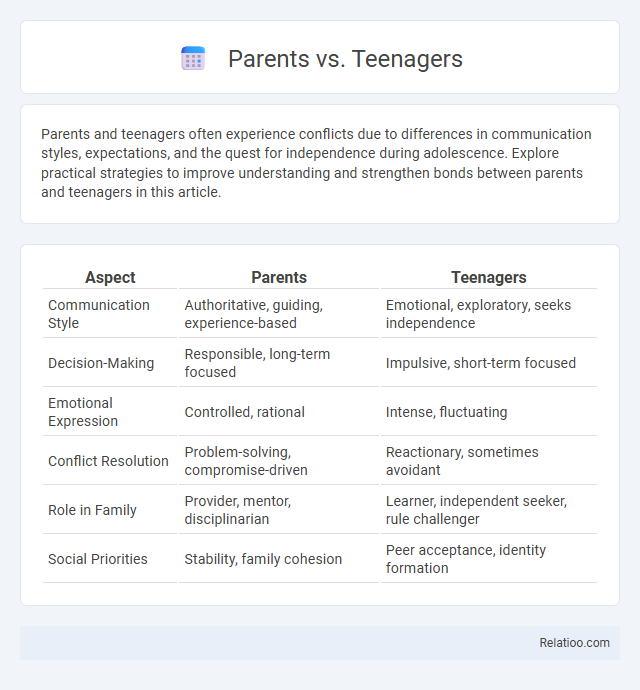Parents and teenagers often experience conflicts due to differences in communication styles, expectations, and the quest for independence during adolescence. Explore practical strategies to improve understanding and strengthen bonds between parents and teenagers in this article.
Table of Comparison
| Aspect | Parents | Teenagers |
|---|---|---|
| Communication Style | Authoritative, guiding, experience-based | Emotional, exploratory, seeks independence |
| Decision-Making | Responsible, long-term focused | Impulsive, short-term focused |
| Emotional Expression | Controlled, rational | Intense, fluctuating |
| Conflict Resolution | Problem-solving, compromise-driven | Reactionary, sometimes avoidant |
| Role in Family | Provider, mentor, disciplinarian | Learner, independent seeker, rule challenger |
| Social Priorities | Stability, family cohesion | Peer acceptance, identity formation |
Understanding the Generation Gap
Understanding the generation gap between parents and teenagers is crucial to addressing issues of disrespect, which often stem from differing values, communication styles, and expectations. Recognizing that both generations experience unique social pressures and developmental stages helps You foster empathy and improve dialogue. Building mutual respect through active listening and patience can bridge the divide, transforming conflicts into opportunities for growth and understanding.
Communication Barriers Between Parents and Teens
Communication barriers between parents and teenagers often stem from differing generational values and language styles, leading to misunderstandings and perceived disrespect. Teens may interpret parental guidance as controlling, while parents see teen reactions as defiance, creating a cycle of frustration. Effective communication requires mutual empathy and active listening to bridge these gaps and foster respect.
Common Conflicts in Parent-Teen Relationships
Common conflicts in parent-teen relationships often stem from differing expectations and communication styles, with disrespect frequently emerging as a central issue. Parents may perceive challenges to authority or unconventional behaviors as disrespect, while teenagers seek autonomy and validation, leading to misunderstandings. Understanding these dynamics can help you navigate and resolve tensions, fostering mutual respect and healthier interactions.
Role of Technology in Family Dynamics
Technology reshapes family dynamics by altering communication patterns between parents and teenagers, often leading to misunderstandings and perceived disrespect. Digital devices enable teenagers to seek autonomy and privacy, which parents may interpret as disengagement or defiance, intensifying generational conflicts. Managing screen time and fostering open dialogues about online behavior are crucial for mitigating disrespect and maintaining healthy parent-teen relationships.
Building Mutual Trust and Respect
Building mutual trust and respect between parents and teenagers hinges on open communication and empathetic listening, fostering an environment where both parties feel valued. Establishing clear boundaries while encouraging autonomy enables teenagers to develop responsibility and self-respect, reducing instances of perceived disrespect. Consistent positive reinforcement alongside understanding emotional challenges during adolescence strengthens the parent-teen relationship, promoting cooperation and mutual understanding.
Setting Boundaries and Expectations
Setting clear boundaries and expectations helps parents navigate the challenge of disrespect from teenagers by fostering mutual understanding and respect. Consistent communication about acceptable behavior and consequences encourages your teenager to develop accountability and self-discipline. Effective boundary-setting strengthens relationships and reduces conflicts, creating a supportive environment for personal growth.
Emotional Changes During Adolescence
Emotional changes during adolescence significantly impact the dynamic between parents and teenagers, often leading to misunderstandings and perceived disrespect. Teenagers experience intense mood swings and heightened sensitivity due to hormonal shifts, which can challenge parental patience and communication. Your ability to recognize these emotional fluctuations fosters empathy and strengthens mutual respect despite conflicts.
Encouraging Healthy Independence
Encouraging healthy independence between parents and teenagers requires balancing respect and autonomy to foster mutual understanding. Establishing clear boundaries and open communication helps you nurture your teenager's growth while minimizing conflicts related to disrespect. Supporting their decision-making skills promotes trust and strengthens your relationship during this critical developmental stage.
Parental Support vs. Overprotection
Parental support fosters teenagers' independence by providing guidance while respecting their growing need for autonomy, reducing instances of perceived disrespect. Overprotection often triggers rebellion and misunderstandings, as teens may feel stifled and unable to develop essential decision-making skills. Balancing support and freedom helps you build trust, encouraging respectful communication and healthy relationships within the family.
Strategies for Strengthening Family Bonds
Effective communication strategies such as active listening and empathizing with each other's perspectives can significantly reduce disrespect between parents and teenagers. Establishing clear boundaries combined with consistent consequences fosters mutual respect and understanding in your family. Prioritizing quality time and collaborative problem-solving activities strengthens emotional connections and builds trust across generations.

Infographic: Parents vs Teenagers
 relatioo.com
relatioo.com